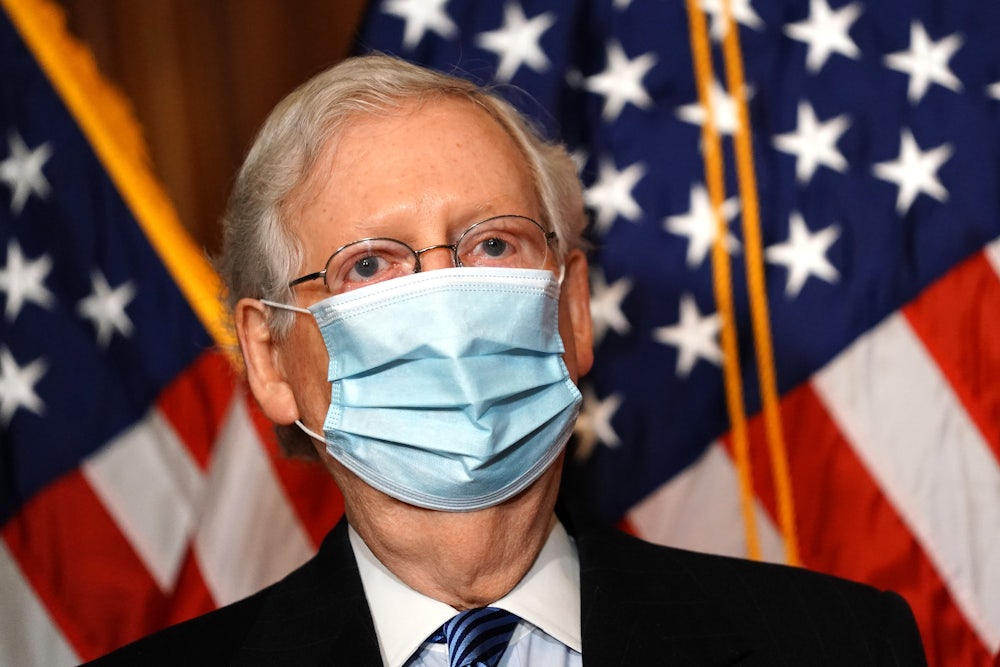Will Senate Republicans ever stop trying to indemnify employers against Covid-19 lawsuits as the price for a Covid stimulus deal? On Tuesday it seemed that they might, but on inspection that turned out to be a feint. Meanwhile, there were signs that Democrats were starting to go wobbly.
The battle over employer liability began in April, when Senate Majority Leader Mitch McConnell said there would be no more pandemic stimulus unless state governments and the Occupational Safety and Health Administration were barred in virtually all cases from penalizing employers for maintaining workplaces that didn’t take effective measures to stop the spread of Covid-19.
It would be hard to overstate how terrible McConnell’s proposal was. In effect, it would require the incoming Biden administration to continue the Trump OSHA policy of green-lighting nearly all Covid-related workplace safety violations.
No, wait, that’s putting it too mildly. McConnell’s plan would require the Biden OSHA to be even more lax on Covid workplace safety enforcement, because it would bar even the tepid Trump OSHA enforcement that took place under the ineffectual “general duties clause,” about which I’ve written here and here. The McConnell proposal would also, seemingly just for the hell of it, suspend virtually all enforcement of wage, hour, and employment-related anti-discrimination statutes during the Covid-19 pandemic.
As bad as McConnell’s indemnification scheme was, it was only a Republican scheme—at least until this month. On December 1, it became a bipartisan scheme, because a liability shield was included in the $908 billion Covid stimulus proposal that Senators Joe Manchin and Susan Collins announced last week. This is the bipartisan Covid stimulus that President-elect Joe Biden endorsed as “a down payment” and that House Speaker Nancy Pelosi and Senate Minority Leader Chuck Schumer accepted as a basis for negotiations.
According to a publicly released “framework,” the Manchin-Collins proposal would “provide short term Federal protection from Coronavirus related lawsuits.” Democrats scatter like autumn leaves when you ask them what exactly this means. It appears to be a retroactive shield of six months’ duration that does not extend to OSHA or state enforcement actions, but rather covers only lawsuits brought by individuals.
Assuming that’s the case, the Manchin-Collins language isn’t going to block very many lawsuits. Individuals already are mostly barred from suing their employers over workplace safety under state workers’ compensation laws. (By one reckoning, only 116 of the 1,032 labor and employment-related Covid claims filed since March concerned workplace safety.)* The comparative scarcity of Covid-19 litigation brought by individuals furnishes the rationale for defending the Manchin-Collins liability language: The indemnification is largely superfluous.
The logic against the Manchin-Collins liability language, though, is pretty compelling. In those rare cases in which individuals are permitted under state workers’ compensation laws to sue their employers, the offenses have to be highly egregious. So the Manchin-Collins provision would protect employers whose behavior by definition is pretty goddamned awful.
McConnell signaled Tuesday that he was willing to withdraw the immunity shield—something he’d previously declared a “red line”—if Democrats would withdraw aid to state and local governments. It was a trick, and it didn’t work. By late Tuesday, Schumer had rejected McConnell’s offer. The reason was that if you strip state and local aid from Covid stimulus—the Manchin-Collins bill proposed $160 billion—you don’t have all that much of a stimulus left. The weekly $600 sweetener to unemployment checks that expired at the end of August was already whittled down by Manchin and Collins to $300.
Meanwhile, a framework that McConnell proposed on December 1 didn’t bother even with that. McConnell’s proposed stimulus consisted mostly of business subsidies—including, in a nice touch of self-parody, an expansion of the business-meal deduction to 100 percent, up from the Cares Act’s already hard-to-defend increase to 50 percent in March. Before Covid-19, the so-called three-martini-lunch deduction was 30 percent.
Schumer’s rejection of McConnell’s swap left open the question of whether Democrats, having already caved a little bit on liability, would cave a lot more. The American Prospect’s David Dayen reported Monday that three Senate Democrats—Manchin, Mark Warner, and Jean Shaheen—“are willing to go along with the McConnell language.” Manchin and Shaheen declined comment to the Prospect, and Warner replied ambiguously.
Meanwhile, Senator Bernie Sanders was having none of it. In a December 4 tweetstorm, Sanders said he wouldn’t support the Manchin-Collins proposal because it “provides 100 percent legal immunity to corporations whose irresponsibility led to the deaths of hundreds of workers. It would continue to provide a get-out-of-jail-free card to companies that put the lives of their workers at risk.” Sanders has a well-deserved reputation for making an unwelcome nuisance of himself whenever Congress is trying to do anything. But in this instance, at least, you couldn’t say the man was wrong.
* This article originally miscounted the number of workplace safety claims related to Covid-19 that had been filed since March.
